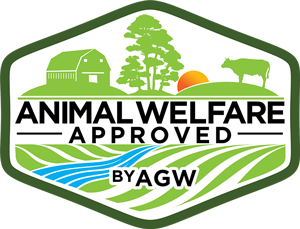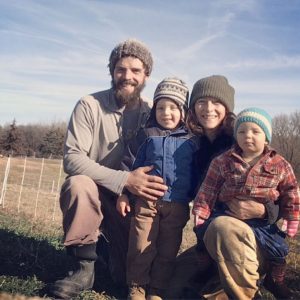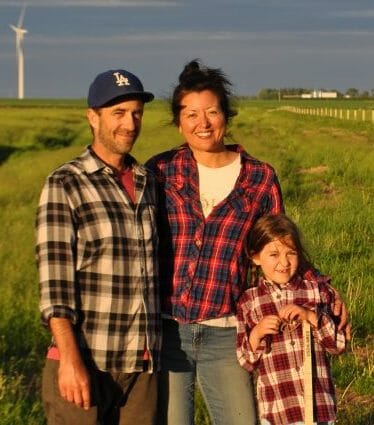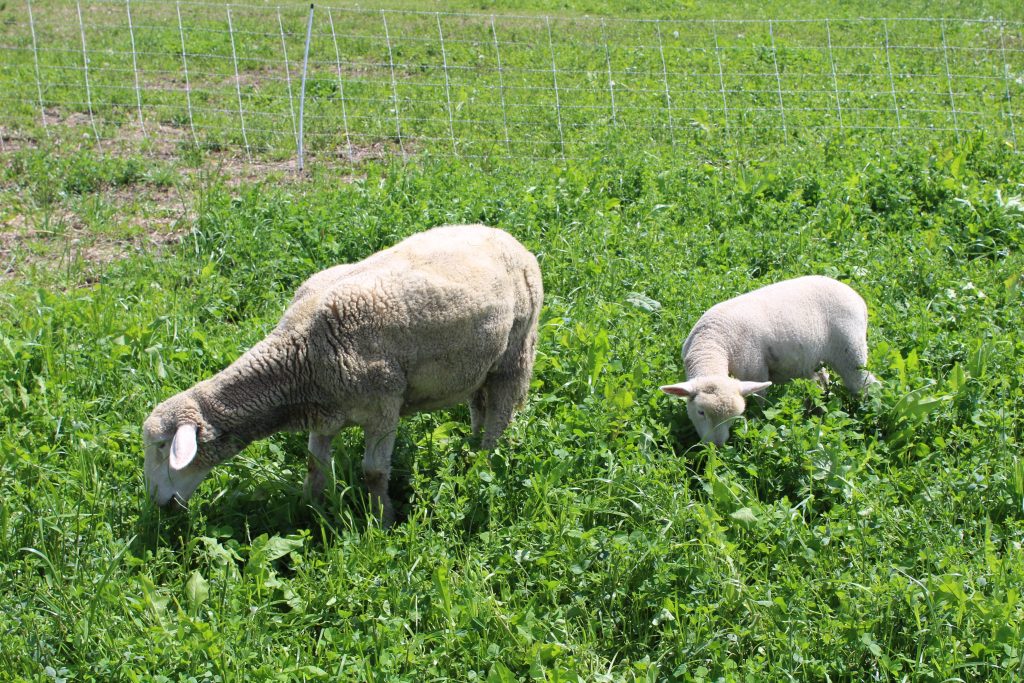Becoming Certified Animal Welfare Approved
So what does certified Animal Welfare Approved (AWA) by A Greener World mean exactly? The AWA label is designed by industry experts to ensure livestock are sustainably raised in outdoor environments where farmers adopt good animal welfare production and slaughter practices. Auditors meet annually with every certified farm in order to confirm that farmers are upholding AWA standards. A specific list of standards based on species can be found on A Greener World’s website.
 Wendy Johnson of Charles City has been able to expand her business opportunities after becoming certified AWA by A Greener World. She and her partner Johnny Rafkin operate Jóia Food Farm near Charles City where they raise pigs, sheep, turkeys, ducks and chickens. In addition to AWA certification, the farm is also certified 100% grass-fed for the sheep and lambs and USDA certified organic for grain crops and pastures.
Wendy Johnson of Charles City has been able to expand her business opportunities after becoming certified AWA by A Greener World. She and her partner Johnny Rafkin operate Jóia Food Farm near Charles City where they raise pigs, sheep, turkeys, ducks and chickens. In addition to AWA certification, the farm is also certified 100% grass-fed for the sheep and lambs and USDA certified organic for grain crops and pastures.
Wendy wanted to obtain the AWA label to give consumers a visual on packaging that shows animal welfare is a top priority at Jóia Food Farm and that their farm is audited by a third-party certifier. Wendy and Johnny had already been practicing many of the protocols laid out for AWA certification so it was a good fit for them to pursue AWA certification.
As a certified AWA producer, Jóia Food Farm is listed in A Greener World’s online database. A Kansas-based aggregator and distributor that focuses on regenerative farming found them on the site and since then, this company has helped Johnson distribute AWA lamb to sell in grocery stores, such as Natural Grocers. This Kansas-based distributor also makes sure that all parts of the animal are utilized, so for example, some of their lamb hides find their way to Patagonia to be made into clothing. On top of the retail price of their products, Joia Food Farm also gets paid a premium for being certified AWA.
For a farm that is looking into AWA certification Wendy recommends to, “Write down everything you do.” She does this by keeping a notebook for every enterprise on the farm. Thoroughly reading AWA protocols and keeping detailed records is a vital part of getting certified, and can help a farmer be prepared for audits to stay certified.

Andy and Betsy Boone operate Driftless Hills Farm nine miles south of Decorah where they work hard to ensure a high quality of life for their animals.
Andy and Betsy Boone are beginning farmers in the process of applying for AWA certification. They raise organic pastured chicken, lamb and pork at Driftless Hills Farm south of Decorah. They want to be AWA certified to showcase their value of animal welfare to customers. “We care how our animals are raised and work very hard to ensure a high quality of life for the animals,” say Andy and Betsy, “We hope this will help convey quality and build trust in our product.” The Boones also want to sell their meat in grocery stores and expect that this label will convey their high standards to consumers they don’t usually get to interact with.
The process of applying for AWA certification may look different for many livestock farmers, but Andy and Betsy began by applying for the Food Animal Concerns Trust (FACT) grant in fall 2018 that is designed to aid producers in improving animal welfare on farms across the country. They were awarded the grant in spring 2019 and plan on using it to install new water lines and better barn lighting. Since they were awarded the grant, they have applied to be certified AWA for their sheep and pigs. Other than improving their record keeping, not many changes need to be made to Driftless Hills Farm because their animals are already raised to have outdoor access throughout the year and meet the other criteria for AWA certification.


